Project management and Agile methodologies remain integral to business success. With organizations leaning towards swift project execution and Agile methods, the significance of project managers and Scrum Masters, evaluated via Scrum Master interview questions, is at an all-time high. Their adaptability in solving complex projects and fostering collaboration among diverse teams underscores their indispensable role in modern business environments.
At Aloa, we're committed to staying at the forefront of project management and Agile methodologies, equipped with comprehensive insights into industry dynamics. Our team of seasoned professionals is dedicated to delivering tailored project management implementations that align with the client's goals. Whether it's optimizing processes or mitigating risks, we're here to empower businesses to thrive.
Through our years of expertise in product development, we've curated this blog to explore the Scrum Master interview questions and their vital roles in modern business environments. Afterward, you will be well-equipped to test and choose potential candidates rigorously.
Let's get started!
What is a Scrum Master?
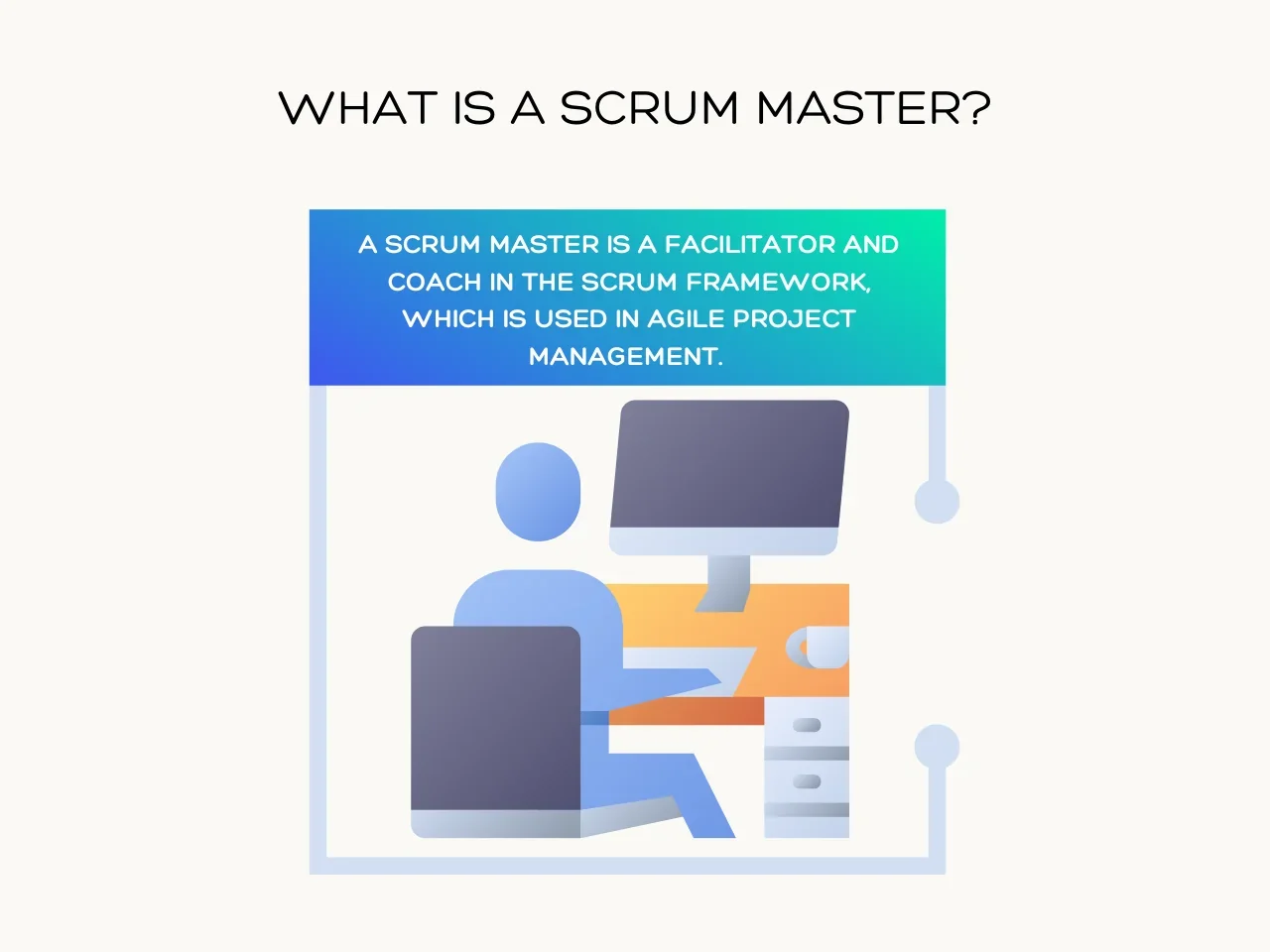
A Scrum Master is a facilitator and coach in the Scrum framework, which is used in Agile project management. They guide development teams, product owners, and stakeholders to effectively implement Scrum practices, remove impediments, and foster a culture of continuous improvement to deliver high-quality products efficiently.
With their strong communication skills, Scrum Masters effectively convey project updates, ensuring clarity and alignment across all involved parties. They play a crucial role in conflict resolution, promoting a positive team dynamic that fuels motivation and focus. More importantly, Scrum Masters are instrumental in driving successful agile implementation and project milestones while meeting stakeholder expectations with precision and efficiency.
13 Scrum Master Interview Questions to Ask
When interviewing for a Scrum Master position, it's crucial to ask the right questions to assess a candidate's understanding of the Scrum framework and ability to lead agile teams effectively. Here are 13 insightful Scrum Master interview questions that can help you evaluate your candidates' experience, adaptability, and Scrum knowledge:
Question #1: What is Scrum?
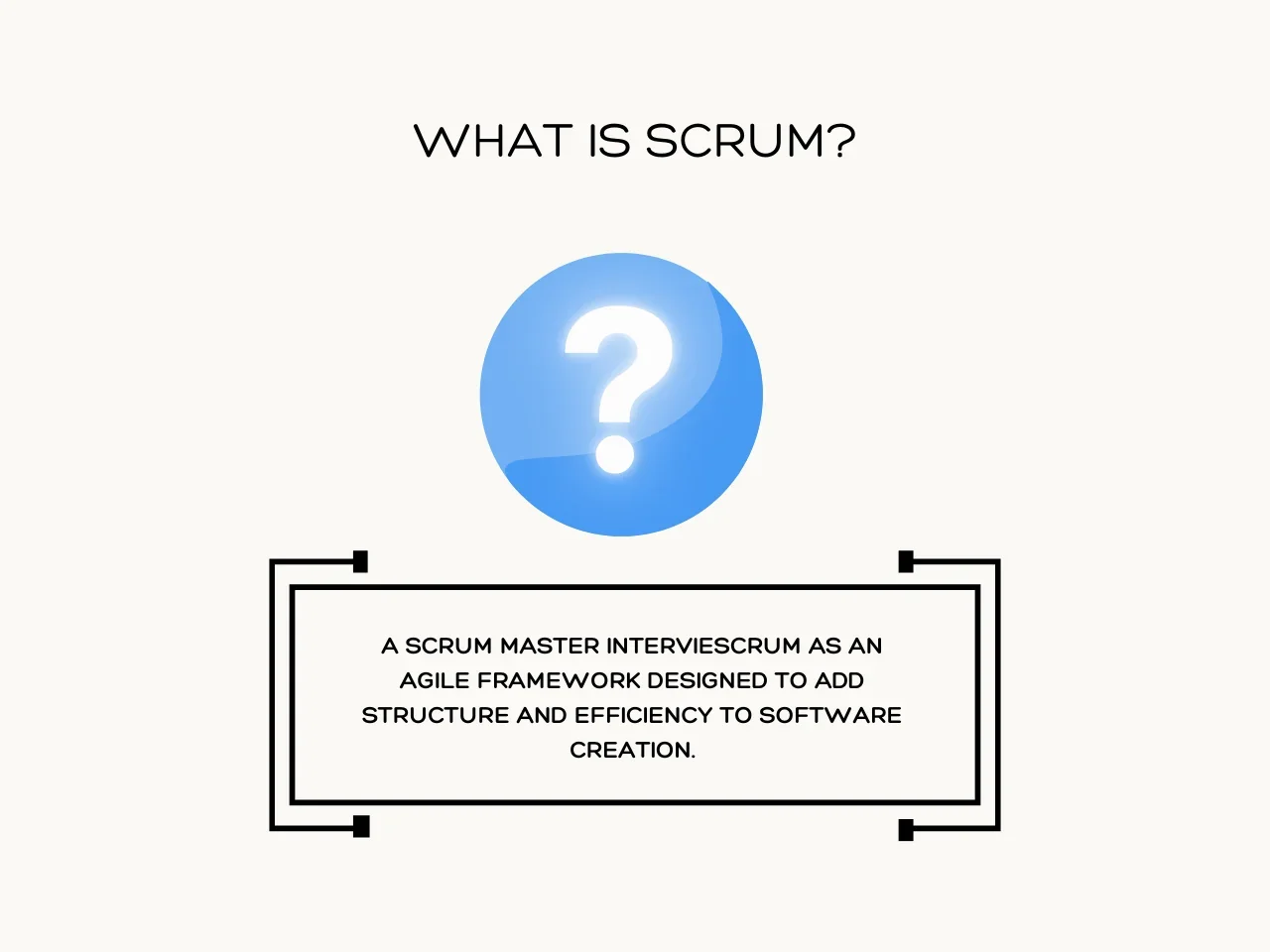
Testing the candidate's knowledge of Scrum through Scrum Master interview questions is crucial for assessing their ability to fulfill the role of Scrum Master effectively. Interviewers can gauge the candidate's comprehension of Agile methodologies and their capacity to implement and support Scrum principles within the team dynamics.
Sample Answer:
A scrum master interviewee should describe Scrum as an Agile framework designed to add structure and efficiency to software creation. They would emphasize how Scrum facilitates continuous improvement and collaboration through its prescribed roles and meetings, ensuring that each sprint delivers enhancements that drive business value.
Question #2: What are Scrum artifacts?
Understanding the Scrum artifacts through Scrum Master interview questions reveals the candidate's understanding of the framework's essential elements and ability to navigate them effectively. This demonstrates their awareness of how artifacts contribute to project transparency and collaboration within the team.
Sample Answer:
A scrum master candidate must explain how these artifacts help manage the development process, ensuring that all team members understand the tasks and the product features being developed. They should illustrate their role in guiding the team through backlog refinement and emphasizing the importance of the sprint goal in every new sprint.
Question #3: What is your approach to risk management in a Scrum environment?
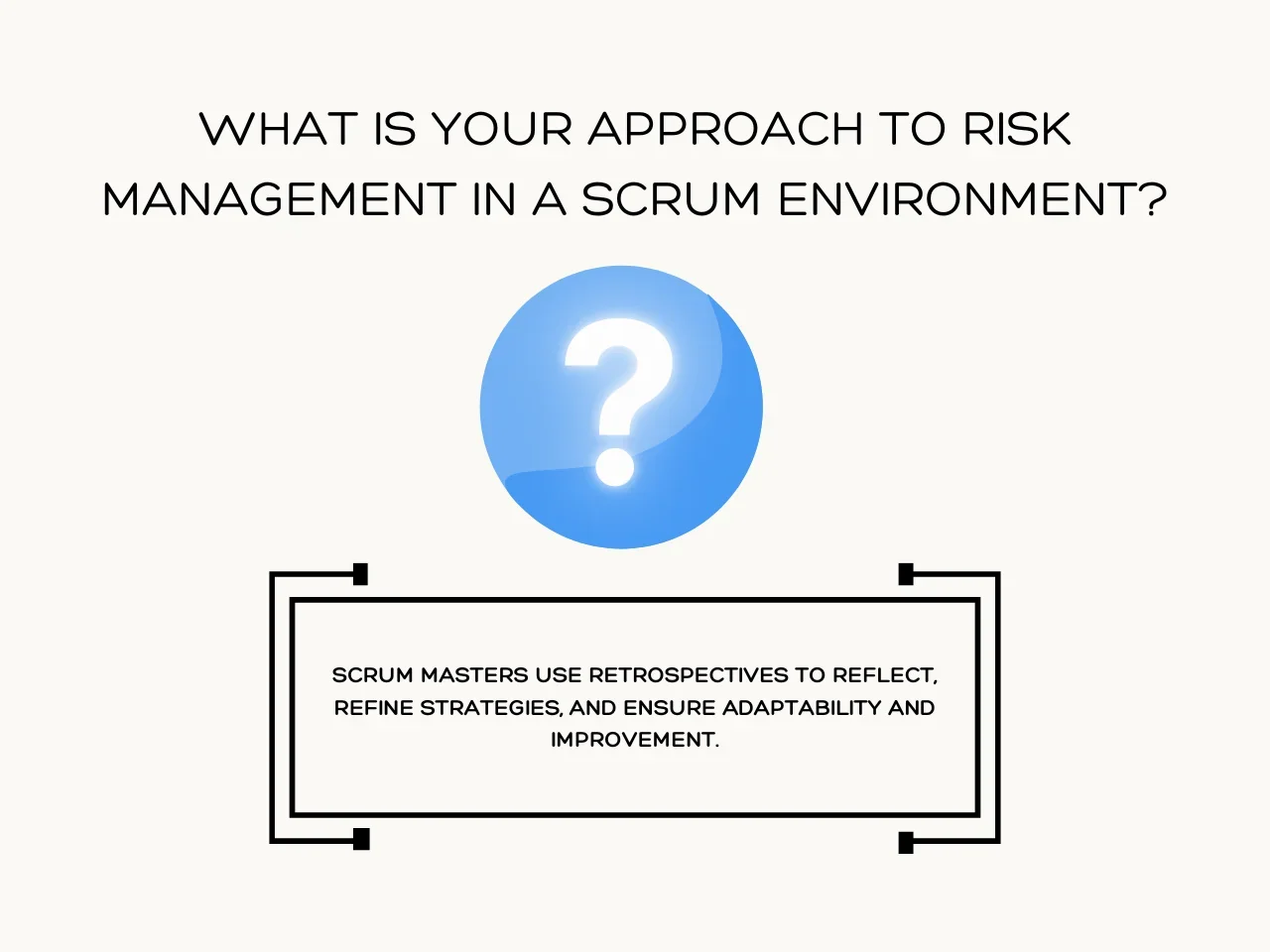
Addressing risk management in Scrum Master interview questions is essential. A Scrum Master typically implements strategies, including frequent review of the product backlog and adjustments during the sprint planning meeting, to mitigate risks early. They prioritize risks in collaboration with the product manager and key stakeholders, integrating solutions into user stories and sprint goals.
Sample Answer:
Candidates must explain their proactive stance on risk management within the Agile framework. They should describe their routine of identifying potential risks during backlog refinement and daily scrum meetings. Effective scrum masters utilize the retrospective meeting to reflect on risks encountered and refine their strategies, ensuring the team’s adaptability and continuous improvement in handling new technologies and development challenges.
Question #4: What tools have you used to track Scrum project progress?
Scrum Master interview questions often probe into the specific tools used to monitor scrum projects. Effective tools facilitate tracking sprint progress, managing backlogs, and ensuring the team adheres to scrum values. Tools like JIRA, Trello, and Asana allow scrum masters to visualize user stories, sprint goals, and burn-down charts.
Sample Answer:
Expect candidates to detail their experience with Agile tools that support the scrum framework, like JIRA, for detailed tracking of user stories and technical debt. They should discuss how these tools integrate into the daily scrum meeting, help plan new sprints, refine the backlog, and engage with key stakeholders. Effective tool use is crucial for maintaining transparency and fostering ownership of their work within the team.
Question #5: What are the limitations of Scrum?
Asking these Scrum Master interview questions is crucial for a Scrum Master, as it allows them to anticipate potential challenges and implement effective solutions. Probing this question, the interviewer aims to assess the candidate's depth of knowledge of Agile methodologies and their ability to navigate its constraints.
Sample Answer:
Candidates should explain that Scrum's iterative nature might only suit some projects, especially where requirements are fixed or not well-defined. They might discuss how the emphasis on frequent delivery can pressure teams, potentially impacting the quality of new features. Effective scrum masters use their experience to guide the team in balancing Agile principles with practical constraints, ensuring that the focus on product features and user needs does not waste time.
Question #6: How would you scale Scrum to accommodate larger teams or more complex projects?
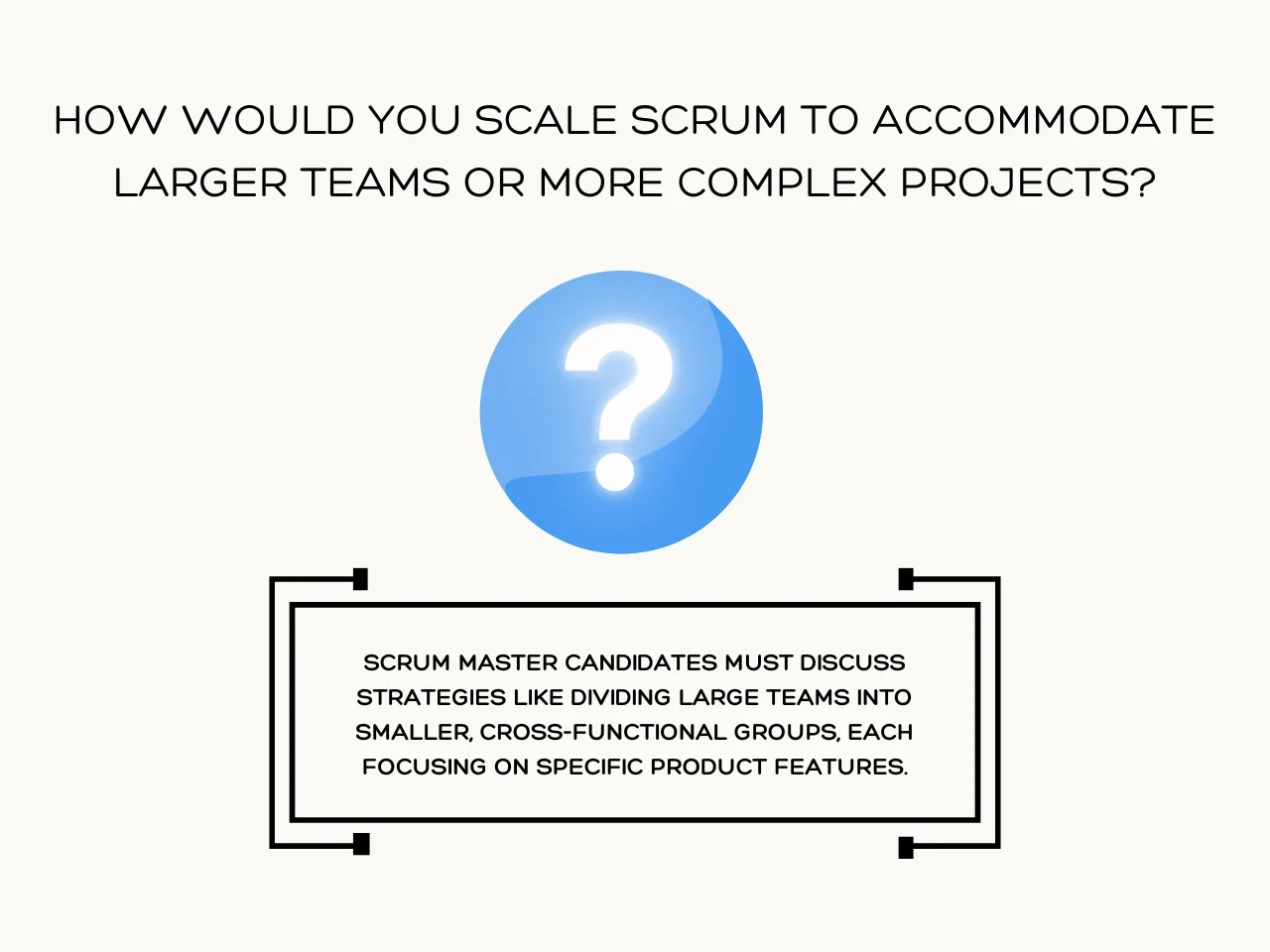
Scaling Scrum for larger teams or complex projects often involves integrating frameworks like the Scrum of Scrums, which helps manage coordination across multiple Scrum teams. A Scrum Master must ensure alignment with the Agile framework and adhere to scrum values.
Sample Answer:
Scrum master candidates must discuss strategies like dividing large teams into smaller, cross-functional groups, each focusing on specific product features. They emphasize the importance of regular backlog refinement sessions and the role of the product manager in keeping key stakeholders updated. In this context, effective risk management and a straightforward product discovery process are crucial.
Question #7: What are Scrum teams' most common pitfalls, and how do you avoid them?
In Scrum Master interview questions, identifying common pitfalls in software development is crucial. One major challenge is wasting time due to poor backlog refinement and unclear product features. A certified Scrum Master should ensure clear communication and thorough product discovery processes to prevent these issues. Additionally, managing risk in the current and upcoming sprints requires attention to detail and proactive risk management strategies.
Sample Answer:
A proficient Scrum Master should explain strategies for avoiding these pitfalls through rigorous risk management and constant engagement with key stakeholders. This involves regularly updating the product manager and agile coach about progress in the current sprint and plans for the upcoming sprint. Effective use of the Agile framework and principles, such as the pillars of the scrum, ensures that each step, from product discovery to new sprint planning, aligns with the team’s goals and experience level.
Question #8: How do you handle a situation where the development team and the product owner have conflicting priorities?
This scenario is common in Scrum Master interview questions, focusing on resolving conflicts between the development team and the product owner. Effective scrum masters use the Agile framework to facilitate understanding and align priorities. They ensure both parties adhere to scrum values and Agile best practices during discussions.
Sample Answer:
Expect candidates to describe how they mediate conflicts by organizing backlog refinement sessions and sprint planning meetings. They should emphasize the importance of clear communication, mutual respect, and compromise to harmonize the product features with the team's capacity. Scrum Masters are crucial in managing risk, fostering collaboration, and focusing on the product discovery process to ensure successful outcomes for all stakeholders.
Question #9: What metrics do you typically use to measure team performance in Scrum?
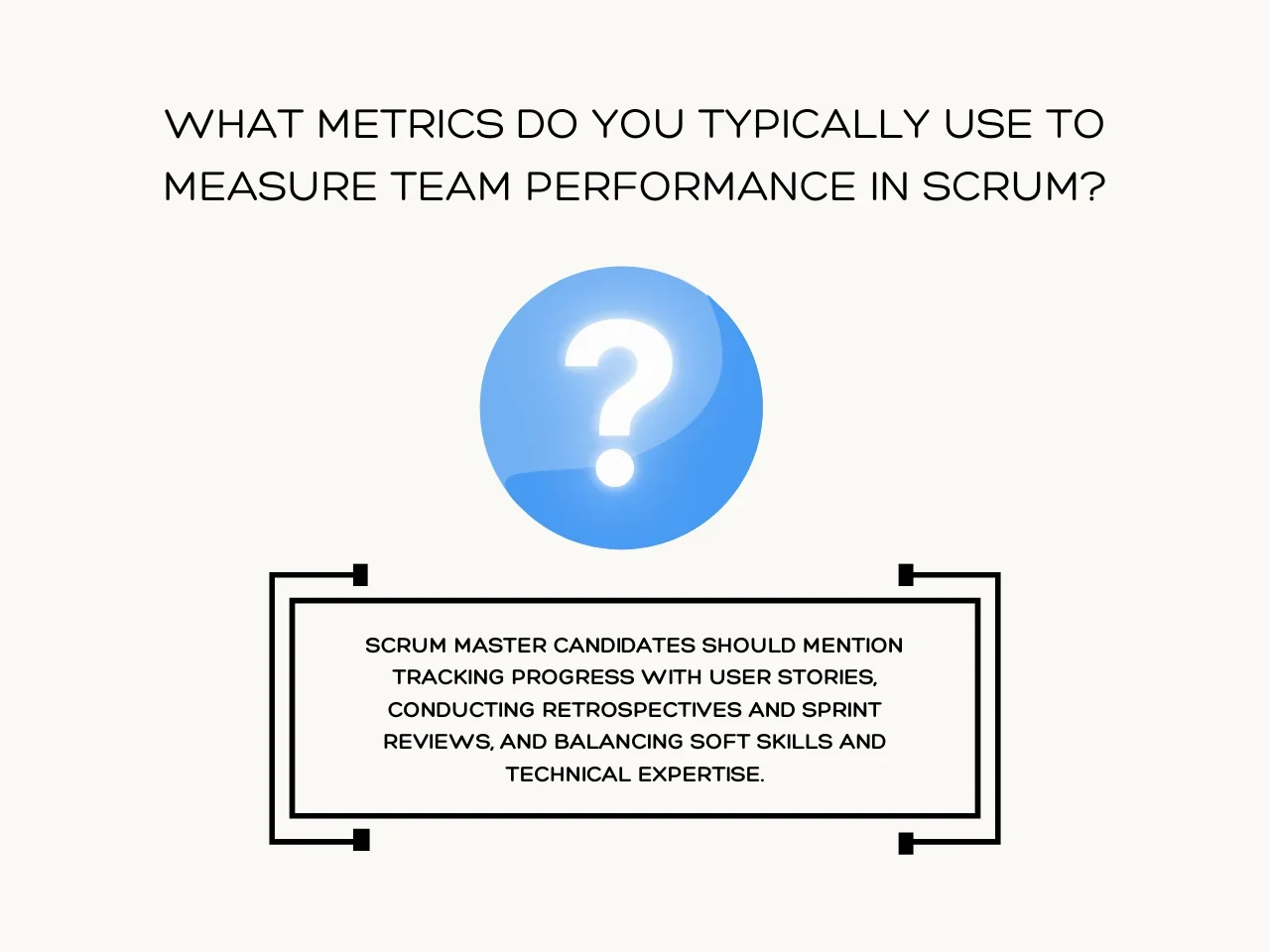
When discussing Scrum Master interview questions, a key focus is how a Scrum Master assesses team performance. Typical metrics include team velocity, burndown charts, and the amount of work completed. These metrics help understand how quickly the team works towards the sprint goal and manages technical debt. Scrum values emphasize ownership of their work and active participation in scrum meetings, such as the daily scrum meeting and sprint planning meeting.
Sample Answer:
Expect scrum master candidates to mention how they track progress through user stories, action items, and acceptance criteria. They should discuss conducting retrospective meetings and sprint reviews to evaluate the team’s performance and set action items for the next sprint. Candidates might also highlight how they balance soft skills and technical expertise to foster an environment aligned with the Agile Manifesto and Scrum guide.
Question #10: How would you handle conflict within a Scrum team?
Conflict resolution is integral to maintaining a productive and harmonious team dynamic. As a Scrum Master, using these Scrum Master interview questions to assess how candidates approach and navigate conflicts is crucial for ensuring smooth collaboration within the team. Interviewers ask these Scrum Master interview questions to determine a candidate's ability to handle challenging situations, foster communication, and maintain team cohesion in the face of adversity.
Sample Answer:
The ideal candidate should understand the company's mission, values, and objectives, aligning their skills and experiences accordingly. They should offer specific examples demonstrating how their background and expertise complement the company's needs and contribute to its success. Additionally, a good fit entails enthusiasm for the company's culture and a genuine interest in its industry, ensuring long-term commitment and collaboration toward shared goals.
Question #11: How would you deal with a difficult Scrum stakeholder?
These Scrum Master interview questions evaluate a candidate's ability to manage challenging stakeholders and conflicts, which is crucial for a Scrum Master role. It also assesses their communication style and problem-solving approach, including using methods like STAR, which is essential for effective project leadership in complex situations involving stakeholders and critical tasks.
Sample Answer:
Expect scrum master candidates to discuss facilitating backlog refinement and sprint planning meetings to align stakeholder expectations with the team's sprint goals. They might explain using retrospective meetings to address concerns and improve stakeholder relationships. Successful candidates will demonstrate how they ensure stakeholder satisfaction without compromising the team’s performance or delivering new features.
Question #12: What is your favorite Scrum event?

When giving Scrum Master interview questions for a Scrum Master role, it's crucial to gauge the candidate's familiarity and enthusiasm for different events. If you're curious about their favorite event, you can gain insight into their understanding of the Scrum framework and personal preferences. Using these Scrum Master interview questions to determine their preferences can also provide context for facilitating these events within a team setting.
Sample Answer:
Candidates should be able to articulate their favorite Scrum event and explain its significance. Effective candidates will likely highlight events such as Sprint Planning, Daily Scrum, or Sprint Review, emphasizing their impact on team collaboration, transparency, and adaptability. This insight provides valuable context for evaluating their approach to facilitating Scrum events within a team environment.
Question #13: How do you effectively assist the product owner in managing the product backlog?
A crucial scrum master interview question involves supporting the product owner with the product backlog. Essential tasks include backlog refinement to prioritize new features, product features, and the development process according to business value and stakeholder needs. This includes integrating feedback from the latest sprint to enhance the upcoming sprint's focus.
Sample Answer:
They must describe their role in facilitating the product discovery process and ensuring the list of items for the upcoming sprint aligns with strategic goals. They should explain how they organize scrum meetings that foster clear communication between the product manager and the team and how they apply Agile framework principles to ensure efficient progress and high-quality output.
Roles and Responsibilities of a Scrum Master
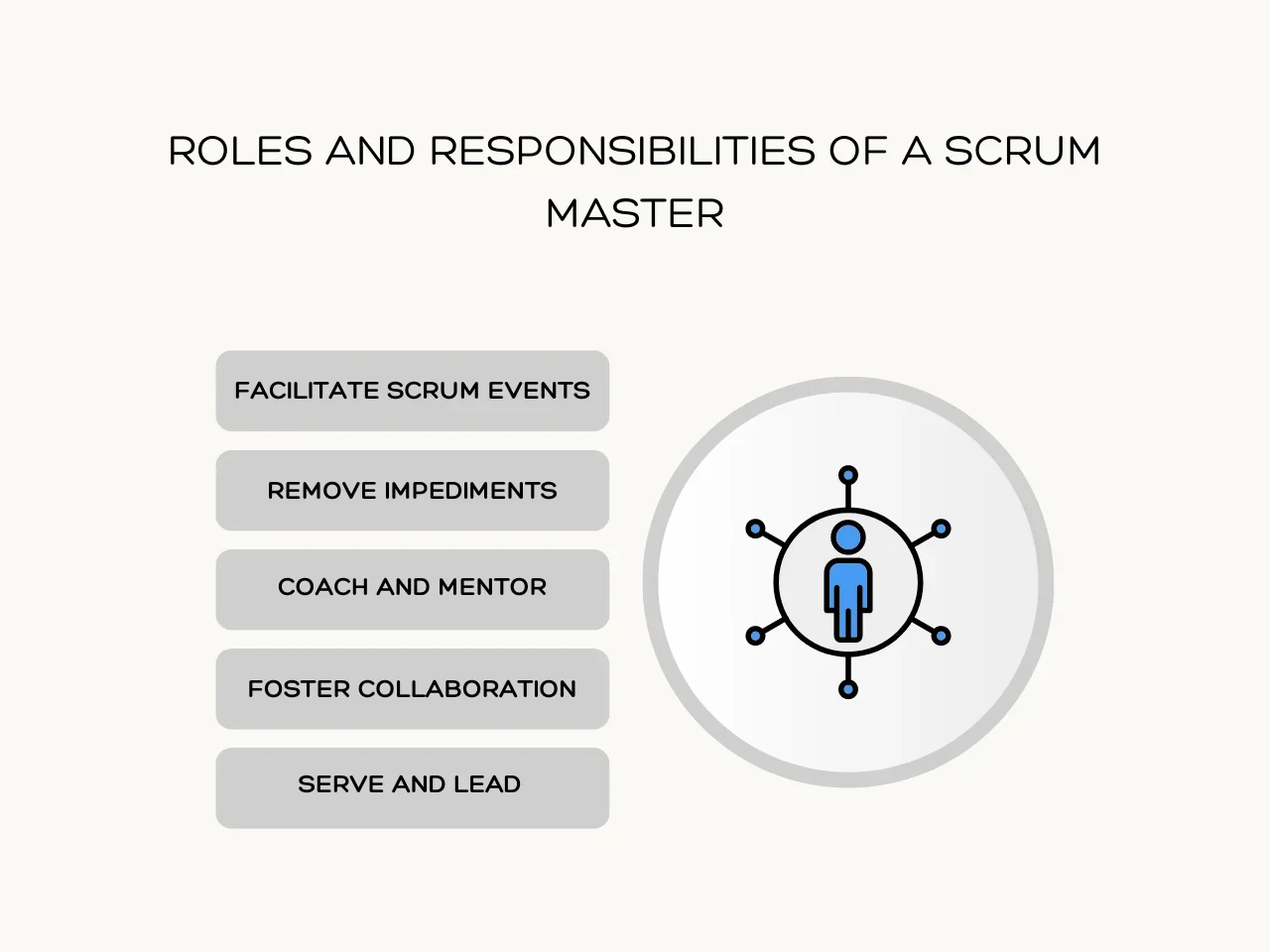
The responsibilities of a Scrum Master in Agile development are multifaceted, and they serve different roles simultaneously. They guide the team through the Scrum framework, fostering collaboration and removing obstacles to ensure smooth progress toward project goals.
Let's delve into some pivotal roles and responsibilities entrusted to a Scrum Master.
Facilitate Scrum Events
Facilitating Scrum events is a critical responsibility for a Scrum Master. This involves guiding and ensuring the smooth execution of ceremonies such as daily stand-ups, sprint planning, sprint reviews, and sprint retrospectives. The Scrum Master facilitates these events to promote transparency, inspect and adapt the team's progress, and address any impediments hindering the team's success.
Remove Impediments
An essential role of a Scrum master is to remove impediments that hinder the team's progress. Identifying and promptly addressing obstacles is crucial for maintaining the project's momentum and ensuring the team can work efficiently. By actively listening to team members and stakeholders, a Scrum Master can uncover issues that may impact the project and take swift action to resolve them.
This proactive approach fosters a collaborative environment where team members feel supported and empowered to deliver their best work. Effective impediment removal boosts team productivity and enhances overall project outcomes, contributing to successfully delivering project goals.
Coach and Mentor
A Scrum Master is expected to coach and mentor the team, guiding them on the principles of Scrum and fostering continuous improvement. This involves aiding team members in understanding and following Scrum practices effectively. Coaching entails guiding self-organization, cross-functionality, and iteration planning, while mentoring consists of sharing knowledge and experience to support team members in their professional growth.
A successful Scrum Master uses coaching and mentoring to empower the team, enhance collaboration, and drive innovation. Through their coaching and mentoring efforts, Scrum Masters contribute to building a high-performing team that can deliver exceptional results.
Foster Collaboration
Fostering collaboration is a crucial aspect of a Scrum master's role. It involves creating an environment where team members can effectively work together towards a common goal. Utilizing strong communication skills and leadership abilities, a Scrum Master encourages the project team to share ideas, insights, and knowledge.
This promotes trust and respect, leading to enhanced problem-solving and innovation. Ultimately, it improves team cohesion and boosts overall project outcomes by leveraging the diverse skills and perspectives within the team.
Serve and Lead
The Scrum Master must "serve and lead" the team simultaneously, embodying servant leadership. This means putting the team’s needs above their own while guiding and inspiring them to achieve their goals. By prioritizing the team's growth and creating a collaborative environment, the Scrum Master enhances the overall efficiency and cohesion of the project team.
Through a servant leadership approach, the Scrum Master facilitates the development of a self-organizing, motivated team that can effectively deliver on project requirements. This dual role of serving the team’s needs while leading them toward achieving project objectives is crucial in creating a high-performing and self-sufficient project team.
Key Takeaway
In 2024, the roles of project managers and Scrum Masters will stand as indispensable pillars for businesses striving to achieve project success. Choosing the right Scrum Master using Scrum Master interview questions offers more than just leadership; it ensures efficient project delivery, effective collaboration, and easy navigating project management.
Moreover, project managers and Scrum Masters drive organizational success by aligning project outcomes with strategic business goals. Through their guidance and effective project management processes, they optimize processes, mitigate risks, and empower teams to deliver value to clients and stakeholders.
Are you looking to recruit top-tier talent for your team using Scrum Master interview questions? Contact our account executives at [email protected] to explore how our network of skilled professionals can help with your project needs. We're dedicated to helping you succeed and thrive in today's dynamic business landscape.

.webp)